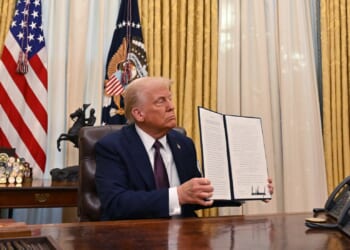Rafe Fletcher is the founder of CWG Speakers.
Safely removed from the horrors of war, it’s easy to frame Ukraine’s struggle purely in ideological terms. Matthew Parris, Times columnist and former Conservative MP, a rare voice of British conservative realism, offers a sobering corrective.
Two years ago, he captured the sheer horror of the conflict. The Russian military sends “over the top a wave of their youngest and least experienced recruits… to mop up the Ukrainian bullets”. Once the rookies are mown down and the Ukrainians running out of ammunition, Russia sends in its more “valuable” soldiers.
Meanwhile a Ukrainian private recalls an exchange of corpses. “Four truckloads of Russian dead were swapped for three truckloads of fallen Ukrainians”. The private said many of his fallen comrades were accomplished university graduates. Parris accepts estimates of 200,000 cumulative deaths; that’s why he cautions against cosplaying the conflict from afar as “good Slavs” versus “bad Slavs”.
But two years on, armchair generals still frame the contest as a moral crusade rather than a brutal war of attrition. Canadian cartoonist Michael de Adder was retweeted approvingly for comparing Donald Trump to Neville Chamberlain.
Invoking the historical spectre of appeasement dismisses any talk of negotiation. This infantile idealism ignores the obvious; as Parris writes more recently: “sooner or later a deal over Ukraine must come”.
Believing this doesn’t diminish Ukraine’s moral case. Emmanuel Macron succinctly outlines that Russia is the aggressor and Ukraine is the victim, and Western powers were right “to help Ukraine and sanction Russia”.
But what are the outcomes of continuing this war? Either keep funding the slaughter of young men in a stalemate. Or we step it up a notch – follow de Adder’s logic, and the result is World War Three.
Western solidarity in early 2022 was impressive and important. It took Russia and its ragtag allies by surprise, marking a decisive shift from Barack Obama’s impotence over Crimea in 2014 and unenforced “red line” in Syria. Ukraine’s subsequent early victories were thrilling; the media understandably delighted in the idea that Russia had horribly miscalculated, and would perhaps even lose territory.
But as the conflict drags on, scale asserts itself. Russia’s military may be outdated and inefficient, but size matters; its GDP may be paltry, but it spends much more of it on the military than any Western nation. Realism must take precedence. Vladimir Putin is a thug and a kleptocrat, but not an ideologue. Russia is a broken and corrupt state that doesn’t represent an existential threat to the West.
We may recoil from the idea that Russia will tangibly benefit from its invasion, that it will likely gain Ukrainian land in any negotiated peace. But Putin’s grander ambitions of marching on Kiev have been conclusively quashed, as has his autonomy to meddle in “Greater Russia” as he sees fit.
The war has inflicted immense damage on Russia. Sanctions have crippled key industries; the country’s brightest minds have fled. Its military has suffered catastrophic losses, forcing the Kremlin into desperate recruitment drives. Even at home, Putin’s grip has shown cracks, most notably in the brief but dramatic Wagner mutiny.
A realist end to the conflict must not erase this humiliation. This is why the relativism of Trump’s inner circle is so concerning.
That was laid bare in the now infamous Oval Office meeting, where frustration with President Zelensky’s supposed grandstanding and hesitation over a minerals deal boiled over into outright hostility. There may be valid concerns in Washington about Ukraine’s leadership. But attacking Zelensky so publicly, and without qualification, suggests the administration sees no clear right or wrong in this war.
David Sacks was one of the biggest cheerleaders of this verbal assault. The White House AI and crypto czar is a relentless critic of Zelensky. He supports the foreign policy philosophy of Jeffrey Sachs and John Mearsheimer, traditionally figures of the left.
The latter’s “offensive realism” argues great powers are compelled to act aggressively to ensure their own survival; meanwhile Sachs tends to believe US foreign policy has been generally pernicious and overreaching. Both are essentially sympathetic to the concept of “might is right”, and that bigger powers are entitled to assert their dominance over smaller ones.
Yet they apply this in an explicitly anti-Western context. Russia and China always have just grievances, while the West is persistently impetuous and overzealous.
It’s very different to the realism espoused by someone like Elbridge Colby. Currently nominated as Under Secretary of Defense for Policy, Colby’s approach is rooted in strategic pragmatism. American military resources are limited, and it must preserve those resources for the true great power conflict with China. Putin is an iniquitous autocrat, but his war is a vain land grab rather than a threat to US hegemony.
Colby’s realism is a return to a recognisable tradition in the Republican Party. The neoconservativism of George W Bush, on the other hand, was the aberration. That group of thinkers believe in a muscular foreign policy, consistently confronting tyranny whether it directly threatens US interests or not.
But that philosophy is discredited by misadventures in the Middle East following 9/11. Former adherents, such as current Secretary of State Marco Rubio, accept its demise. Against neoconservatism’s moral certainty, realism may make us uncomfortable. But it stems from recognition of essential truths, not least that war has huge costs and unintended consequences.
On his recent visit to Ukraine, Parris says he “cannot overstate the detestation of Russia, the shock and indignation encountered everywhere”. Yet he “cannot understate the difference between what Ukrainians want and what they expect. They had a growing recognition that a settlement… must come”.
We must hope that these realist instincts prevail in the Trump administration. That war is always an undesirable last resort, and that the US cannot continue to act as the world’s policeman. Nevertheless, no moral equivalence should be drawn: a peace deal must recognise Russia’s transgression.
This separates genuine strategic realism from the thinking championed by Sacks and his allies such as Tulsi Gabbard. They do not merely reject “forever wars” on practical grounds: they see all former administrations as fundamentally corrupt, drawing moral equivalence between Western interventionism and authoritarian expansionism. They find common ground with figures like Jeremy Corbyn, united in the belief that US power is always and everywhere destructive.
Yet if the US retreats into a posture of indifference, allowing other great powers to act with impunity, what does that mean for NATO and other US allies? And what message does it send to Xi Jinping as he looks across the Taiwan Strait? It’s an awkward dilemma for former prime ministers Boris Johnson and Liz Truss, who have both unwaveringly supported both Zelensky and Trump.
Conservative advocates of the war must accept that unquestioning backing for Ukraine is no longer the prevailing view in Washington. But they shouldn’t despair. A recognisable realism persists in figures like Colby and Rubio. British Conservatives must ensure strong transatlantic ties with this faction of the Republican Party, firmly distinguishing strategic realism from the anti-Western relativism creeping into parts of the right.
Sir Keir Starmer’s recent charm offensive in Washington shows that Trump can be influenced. Conservatives must seize that opportunity, and guide the conversation in a direction that is pragmatic and principled.





![Trump's Admin Guts Another ‘Rogue Government Agency with Zero Accountability’ [WATCH]](https://www.right2024.com/wp-content/uploads/2025/03/Trumps-Admin-Guts-Another-‘Rogue-Government-Agency-with-Zero-Accountability-350x250.jpg)
![‘We All Owe Him (Elon) a Huge Debt of Gratitude’ [WATCH]](https://www.right2024.com/wp-content/uploads/2025/03/‘We-All-Owe-Him-Elon-a-Huge-Debt-of-Gratitude-350x250.jpg)


![NCAA Champ Salutes President Trump After ‘BIGGEST UPSET IN COLLEGE WRESTLING HISTORY’ [WATCH]](https://www.right2024.com/wp-content/uploads/2025/03/NCAA-Champ-Salutes-President-Trump-After-‘BIGGEST-UPSET-IN-COLLEGE-350x250.jpg)







